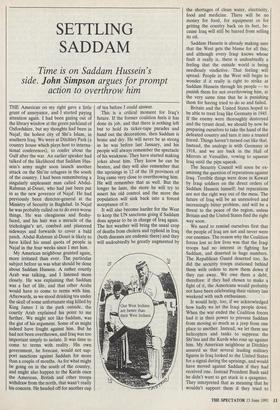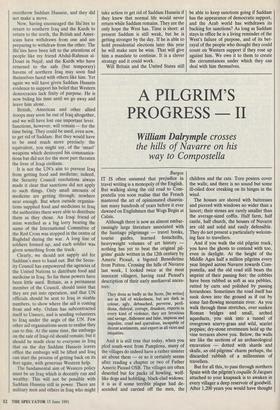SETTLING SADDAM
Time is on Saddam Hussein's action to overthrow him
THE American on my right gave a little grunt of annoyance, and I started paying attention again. I had been gazing out of the library window at the green parkland of Oxfordshire, but my thoughts had been in Najaf, the holiest city of Shi'a Islam, in southern Iraq. We were at Ditchley Park (a country house which plays host to interna- tional conferences), to confer about the Gulf after the war. An earlier speaker had talked of the likelihood that Saddam Hus- sein's army might soon launch another attack on the Shi'ite refugees in the south of the country. I had been remembering a singularly unpleasant man called Abdul- Rahman al-Douri, who had just been put in as the new governor of Najaf. He had previously been director-general at the Ministry of Security in Baghdad. In Najaf he was probably called on to do even worse things. He was oleaginous and fleshy- faced, and his hair was a miracle of the trichologist's art, combed and plastered sideways and forwards to cover a bald patch. Abdul-Rahman al-Douri is likely to have killed his usual quota of people in Najaf in the four weeks since I met him.
My American neighbour grunted again, more irritated than ever. The particular subject before us was what should be done about Saddam Hussein. A rather courtly Arab was talking, and I listened more closely. He was explaining that Saddam was a fact of life, and that other Arabs would have to come to terms with him. Afterwards, as we stood drinking tea under the skull of some unfortunate stag killed by King James I in the park outside, the courtly Arab explained his point to me further. We might not like Saddam, was the gist of his argument. Some of us might indeed have fought against him. But he had not been overthrown, and Iraq was too important simply to isolate. It was time to come to terms with reality. His own government, he forecast, would not sup- port sanctions against Saddam for more than a couple of months. As for what might be going on in the south of the country, and might also happen to the Kurds once the American, British and other troops withdraw from the north, that wasn't really his concern. He headed off for another cup of tea before I could answer.
This is a critical moment for Iraq's future. If the former coalition feels it has done its job, and that there is nothing left but to hold its ticker-tape parades and hand out the decorations, then Saddam is home and dry. He will never be as strong as he was before last January, and his people will always remember the spectacle of his weakness. They have started making jokes about him. They know he can be beaten, and they will also remember that the uprisings in 12 of the 18 provinces of Iraq came very close to overthrowing him. He will remember that as well. But the longer he lasts, the more he will try to assert his old control and the more the population will sink back into a forced acceptance of it. It will also become harder for the West to keep the UN sanctions going if Saddam does appear to be in charge of Iraq again. The hot weather will bring the usual crop of deaths from cholera and typhoid in Iraq (both diseases are endemic there) and they will undoubtedly be greatly augmented by the shortages of clean water, electricity, food and medicine. There will be no money for food, for equipment or for getting the country back on its feet, be- cause Iraq will still be barred from selling its oil.
Saddam Hussein is already making sure that the West gets the blame for all this; and although every Iraqi knows whose fault it really is, there is undoubtedly a feeling that the outside world is being needlessly vindictive. That feeling will spread. People in the West will begin to wonder if it really is right to strike at Saddam Hussein through his people — to punish them for not overthrowing him, at the very same time that he is punishing them for having tried to do so and failed.
Britain and the United States hoped to be able to treat Iraq like Germany in 1945. If the enemy were thoroughly destroyed and the tyrant dead, we should by now be preparing ourselves to take the hand of the defeated country and turn it into a trusted friend. Things haven't turned out like that. Instead, the analogy is with Germany in 1918, and we are back in the Hall of Mirrors at Versailles, vowing to squeeze Iraq until the pips squeak.
The Security Council will soon be ex- amining the question of reparations against Iraq. Terrible things were done in Kuwait by Iraqi soldiers on the direct orders of Saddam Hussein himself; but reparations are not the right way out of the mess. The future of Iraq will be an unresolved and increasingly bitter problem, and will be a threat to the peace of the region, unless Britain and the United States find the right way soon.
We need to remind ourselves first that the people of Iraq are not and never were our enemies. The reason why the Coalition forces lost so few lives was that the Iraqi troops had no interest in fighting for Saddam, and deserted in huge numbers. The Republican Guard deserted too. So did the security troops stationed behind them with orders to mow them down if they ran away. We owe them a debt, therefore: if they had chosen to make a fight of it, the Americans would probably not have been celebrating their victory last weekend with such enthusiasm.
It would help, too, if we acknowledged how badly we let the Iraqi people down. When the war ended the Coalition forces had it in their power to prevent Saddam from moving so much as a jeep from one place to another. Instead, we let them use helicopters and tanks to suppress the Shi'ites and the Kurds who rose up against him. My American neighbour at Ditchley assured us that several leading military figures in Iraq looked to the United States for a signal during the uprisings, and would have moved against Saddam if they had received one. Instead President Bush said he didn't want to get stuck in a quagmire. They interpreted that as meaning that he wouldn't support them if they tried to overthrow Saddam Hussein, and they did not make a move.
Now, having encouraged the Shi'ites to return to southern Iraq and the Kurds to return to the north, the British and Amer- icans have withdrawn from one and are preparing to withdraw from the other. The Shi'ites have been left to the attentions of people like my friend Abdul-Rahman al- Douri in Najaf, and the Kurds who have returned to the safe (but temporary) havens of northern Iraq may soon find themselves faced with others like him. Yet again we will have given Saddam Hussein evidence to support his belief that Western democracies lack fixity of purpose. He is now biding his time until we go away and leave him alone.
British, American and other allied troops may soon be out of Iraq altogether, and we will have lost one important lever. Sanctions, however, will remain — for the time being. They could be used, even now, to get rid of Saddam. But they would have to be used much more precisely: the equivalent, you might say, of the 'smart' weapons which destroyed his communica- tions but did not for the most part threaten the lives of Iraqi civilians.
It is not the UN's aim to prevent Iraq from getting food and medicine; indeed, the Security Council resolutions always made it clear that sanctions did not apply to such things. Only small amounts of medicine are getting through; nowhere near enough. But when outside organisa- tions supplied food and medicines to Iraq the authorities there were able to distribute them as they chose. An Iraqi friend of mine watched as a big lorry bearing the name of the International Committee of the Red Cross was stopped in the centre of Baghdad during the war. A long line of soldiers formed up, and each soldier was given something from the truck.
Clearly, we should not supply aid for Saddam's men to hand out. But the Secur- ity Council has empowered the agencies of the United Nations to distribute food and medicine in Iraq. So far these powers have been little used. Britain, as a permanent member of the Council, should insist that they are put into operation, and that UN officials should be sent to Iraq in sizable numbers, to show where the aid is coming from and why. Oxfam has subcontracted itself to Unesco, and is sending volunteers to Iraq under the aegis of the UN. Few other aid organisations seem to realise they can to this. At the same time, the embargo on the sale of Iraqi oil should remain; but it should be made clear to everyone in Iraq that on the day Saddam Hussein leaves office the embargo will be lifted and Iraq can start the process of getting back on its feet again, with generous Western help.
The fundamental aim of Western policy must be an Iraq which is decently run and wealthy: This will not be possible with Saddam Hussein still in power. There are military men and others in Iraq who might take action to get rid of Saddam Hussein if they knew that normal life would never return while Saddam remains. They are the only hope the West has. Time is short: at present Saddam is still weak, but he is getting stronger by the day. If he is able to hold presidential elections later this year he will make sure he wins. That will give him a mandate to continue. It is a clever strategy and it could work.
Will Britain and the United States still be able to keep sanctions going if Saddam has the appearance of democratic support, and the Arab world has withdrawn its backing for sanctions? As long as Saddam stays in office he is a living reminder of the West's failure of purpose, and of its bet- rayal of the people who thought they could count on Western support if they rose up against him. We owe it to them to create the circumstances under which they can deal with him themselves.



















































 Previous page
Previous page